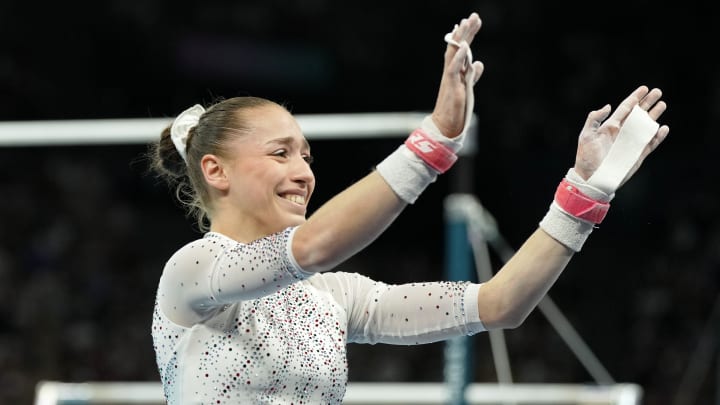French-Born Kaylia Nemour Wins Algeria’s First Gymnastics Olympic Gold

PARIS — For years, Kaylia Nemour had pictured this moment: the routine of her life, the moment of her life, at the Olympics in her home country, with thousands of fans cheering her name. When she dismounted the uneven bars on Sunday with a release move named after her, a gold medal all but sealed, she immediately burst into tears.
And when the scores were final and the result confirmed, her coaches draped her in the flag of the country she is representing here—not France, but Algeria.
“I am very, very proud to have this medal for Algeria, the first in history,” she said in French afterward. A reporter pointed out that it was also the first for Africa. “Yeah,” she added. “It’s crazy.”
That was about as close as she got to acknowledging the situation—she later briefly called it “complicated”—that has a 17-year-old born and raised 200 miles southwest of Paris competing for a country whose national language, Arabic, she does not speak. She competed for France as a junior, but a complex dispute with the French federation led her to change her nationality two years ago to that of Algeria, where her father’s parents were born—and in the process cost France its best chance at an Olympic gymnastics medal.
In 2021, the French gymnastics federation announced that all Olympic hopefuls must train at one of its centers, either in Vincennes, a suburb of Paris, or in St.-Étienne, in the southeast. Nemour, who lived less than a mile from her gym in Avoine, was not interested in moving.
“I’ve been here pretty much since I was born,” she told The New York Times last month. “My home is within walking distance from the gym. I’m really happy with my coaches. Why would I leave?”
At the same time, the federation was ensnared in a battle against those coaches, Marc and Gina Chirilcenco, over Nemour’s health. She had undergone knee surgery to treat advanced osteochondritis, a condition that causes inflammation in joints. The federation worried that the Chirilcencos had overworked her and declined to clear her to resume training. The coaches denied the allegation. The federation cut the gym’s funding. Authorities investigated and eventually cleared the coaches.

But Nemour had had enough. In July 2022, she switched her nationality to Algeria, and the international gymnastics federation approved the move—but the French federation blocked it. An online petition circulated. In May ’23, France TV aired a report in which six former French gymnasts detailed abuse they had suffered while in the program. Finally the French minister for sport, Amelia Oudea-Castera, got involved; Nemour was released two weeks before May’s African championships, in which she essentially needed to compete to have a chance at the Olympics.
She won the all-around title there, giving her a berth at the world championships, at which she qualified for the Olympics and won a silver medal on the uneven bars—the first gymnastics medal in African history.
This week at the Bercy Arena, applause for her was raucous, in part because there was nowhere else for French fans to direct their energy: Their women’s team failed to qualify any athletes to a final. Nemour, meanwhile, made the individual all-around final and the uneven bars final. She finished fifth in Thursday’s all-around. But it was always Sunday’s event that would be her masterpiece.
She is so talented that even her opponents are rooting for her. “I really wanted Kaylia to get a win, just because she’s so incredible,” said American bronze medalist Suni Lee. She added, “She just flies. She gets up there and just looks like a feather flying over the bar. She’s just so beautiful to watch. Everything goes so fast. It’s so smooth and I’m in awe every single time.”
This was Lee’s sixth medal, so she knows the routine, but Nemour is new to it all. Lee had to show her where to stand for the photographers and how to use the simultaneous interpretation in her press conference.
But first they stood for the medal ceremony, including the raising of the medalists’ flags. Nemour beamed during the Algerian national anthem, which includes the line, “O France, this is the day of reckoning,” a reference to its fight for independence from its former colonizer. It was an appropriate lyric for Nemour’s battle. But she did not sing along. She doesn’t know the words.

Stephanie Apstein is a senior writer covering baseball and Olympic sports for Sports Illustrated, where she started as an intern in 2011. She has covered 10 World Series and three Olympics, and is a frequent contributor to SportsNet New York's Baseball Night in New York. Apstein has twice won top honors from the Associated Press Sports Editors, and her work has been included in the Best American Sports Writing book series. A member of the Baseball Writers Association of America who serves as its New York chapter vice chair, she graduated from Trinity College with a bachelor's in French and Italian, and has a master's in journalism from Columbia University.
Follow stephapstein